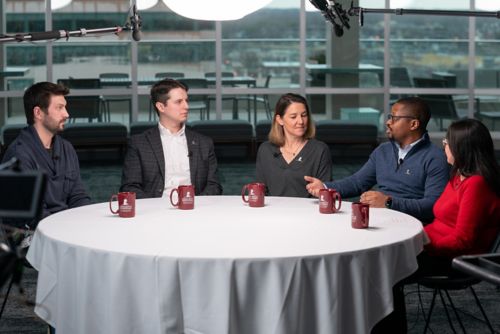St. Jude Family of Websites
Explore our cutting edge research, world-class patient care, career opportunities and more.
St. Jude Children's Research Hospital Home

- Fundraising
St. Jude Family of Websites
Explore our cutting edge research, world-class patient care, career opportunities and more.
St. Jude Children's Research Hospital Home

- Fundraising
St. Jude Mentorship Roundtable

Watch scientific mentors discuss the value of mentorship
Five St. Jude scientific mentors participate in a Round Table discussion of mentorship.
This is a transcript of the St. Jude mentorship roundtable conversation. Each speaker is identified by full name and title upon first speaking, and only by surname for any later contributions to the conversation.
Daniel Blair PhD, Assistant Member, St. Jude Faculty, St. Jude Department of Chemical Biology and Therapeutics:
Some of the best things I've noticed about people who've mentored me, they've been very patient. They've accepted that I need to grow. I don't know what everyone else has really experienced during that time as being a trainee, but at least that's what was most beneficial to me.
Ombeni Idassi, MHS, Program Coordinator, St. Jude Department of Global Pediatric Medicine:
For me it was open communication. A mentor who is willing to, you know, kind of hear the critiques that their mentee has kind of helps for the growth of the mentee to know that they actually have a voice versus just feeling as though they have to kind of fall into just fall in line with the decisions and the way that the lab runs and not really have much of their own personality.
Heather Mefford, MD, PhD, Member, St. Jude Faculty, St. Jude Department of Cell and Molecular Biology and St. Jude Center for Pediatric Neurological Diseases Research:
I think understanding where the mentee is coming from, like what their life situation is, what their goals are for their career, and being open to mentoring, even if it's not perhaps the path that that mentor took or the situation that they're in is important.
Peter Chockley, PhD, Postdoctoral Research Associate, St. Jude Department of Bone Marrow Transplantation and Cellular Therapy:
One of the biggest things I've enjoyed was when the mentor gave me a decent bit of freedom to both fail and succeed a little bit on my own terms. And so then, you know, it's not fully guardrails off, but enough to kind of navigate over the spaces to actually like identify what I can do to then grow and then check back in and keep going.
Hong Lin, PhD, Senior Scientist, St. Jude Department of Developmental Neurobiology:
Yeah, I echo all you said. My mentor knows what I'm good at and they’re open, right? And so positive and inspiring to me that kind of mentor really influenced my life and my passion for science and I want to be that kind of mentor also.
Blair:
I think for me, the biggest win I felt was a point at which I knew I'd created the right environment in my lab where a team member would tell me something that was in the best interests of the lab was very selfless. To me, that reassured me that I'd created an environment where people not only cared about the goals that they were pursuing found the meaningful, but found them significant enough that they'd be willing to suggest and provide options for how we could move forward.
Or things we should do, or things I should consider. And for me, that's really one of the most exciting moments, was that.
Mefford:
Big mentorship win for me, I remember helping my first postdoc negotiate her first job, which was like really powerful, right? And especially as a woman in science, helping other women get to positions and what they deserve was was great. But I drew on my you know, when I was a mentee at that stage and talking to other women around me saying, okay, how do I how do I do this, right?
How do you negotiate for whatever it is, whether it's lab space or startup or salary or anything else? And so I think seeing seeing your mentees succeed in the path that they want to be on, it isn't easy.
Chockley:
You know, one of the big ones was a recent PhD grad. When it was all said and done, they're just like, you know, thank you actually. Like, you know, you were you were the scary postdoc initially. And but then I realized you just enjoyed all of this so much. And you wanted us to do well and learn it really well.
I was so proud for her and when she was done. thank you. I'm actually going to go do a postdoc. And she was on the fence about all this. And I'm like, Well, buckle up. Enjoy. You know, good luck. You know, you don't have to be a postdoc. But, you know, it was nice to see somebody that chose to do this path despite the ups and downs and motivate them to continue as well, just to see it through
Lin:
It's kind of a lifetime investment. They will come to you all at the time and then you ask them how they're doing and you and also give them suggestions.
Idassi:
Yeah. Which also reminds me I need to put in a letter of recommendation. But that's also like really cool because I was that person, you know, I was the person who was reaching out to my. Yeah, exactly. My undergraduate research mentor, like, you know, every single week to get my letter of recommendation in. But it feels kind of awesome on this side to be like, I'm now investing you. My words, as beautiful as I'm going to try to make them, is going hopefully to help propel you to the next step.
And when you take that next step, whether you succeed or whether you fail, I'm always going to be right there.
Mefford:
I mean, that's the thing, right? As mentors, we're guides. We're not making decisions for our trainees.






